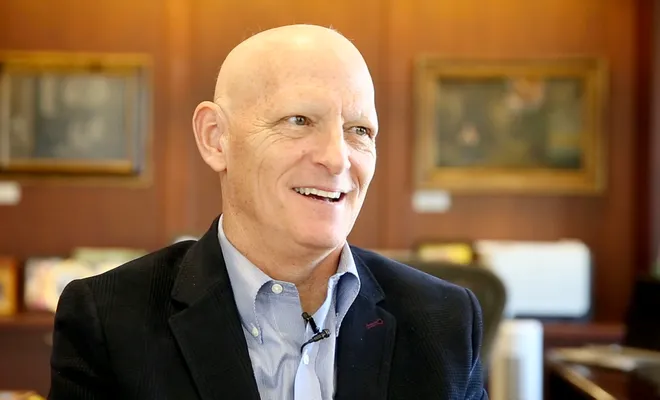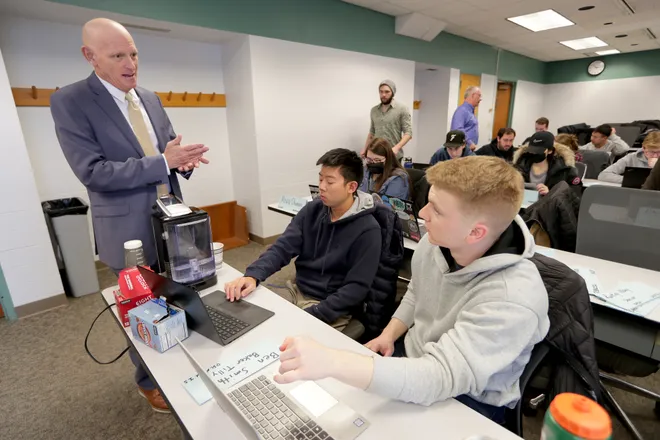University president dies after 3 year battle with sarcoma: What to know about rare cancer

Marquette University's president, Michael Lovell, died after battling a rare cancer for three years. Now, his community is mourning the loss.
"The days ahead will be full of heartbreak," the university's statement said. "In this time of grief and sadness, let us come together as a community linked by faith and love."
On Sunday, the university announced that Lovell, 57, died while on a trip to Italy after battling cancer for three years. He was there with with his wife, members of the Society of Jesus and the University's Board of Trustees on a Jesuit formation pilgrimage, states a press release posted by the university. He became ill in Rome and was taken to a hospital.
In September 2021, Lovell announced he was diagnosed with sarcoma, a rare form of cancer, reports the Milwaukee Journal Sentinel, a part of the USA TODAY Network.
He began chemotherapy shortly after and continued to work and ran the 12,000-student university through the midst of the pandemic.
"When you don't know how much time you have left, you want your days to be impactful, and you want to do things that you love," Lovell told the Milwaukee Journal Sentinel in 2022. "And so you ask me, why do I want to work? Well, you know, there are days that are hard, to be honest with you, and the last few years weren't easy, but I love being on this campus. I love being in our community."
The school, which describes itself as a "transformative, Catholic, Jesuit university" is located in downtown Milwaukee, Wisconsin.

Lovell was the first lay president of Marquette University, and is described as a "fixture of the Milwaukee community."
He was also deeply committed to his faith and is survived by his wife and children.
What is Sarcoma?
Lovell had a rare cancer known as sarcoma.
The disease causes malignant tumors that form in the bone and connective tissue, like fat, blood vessels, nerves and the tissue around bones and joints, according to the Cleveland Clinic.
The cancer can be treated with surgery, radiation, chemotherapy, targeted therapy and immunotherapy.
Only 1% of adults and 15% of children diagnosed with cancer have sarcoma.
What are the symptoms of sarcoma?
The following are symptoms of sarcoma, according to the Mayo Clinic:
- Abdominal pain
- Bone pain
- A lump, possibly painful, that can be felt through the skin
- Bones breaking unexpectedly after a minor injury or no injury at all
- Weight loss
What causes sarcoma?
The cause of sarcomas is unclear, states the Mayo Clinic. But cancers occur when a cell's DNA mutates and tells it to uncontrollably grow and divide.
Increased risk factors
The following can increase the likelihood of a person developing a sarcoma, states the Mayo Clinic:
- Chronic swelling (lymphedema): Lymphedema, when the body begins to swell because of a backup of lymph fluid due to a block or damage to the lymphatic system, increases the risk of a type of sarcoma called angiosarcoma. Lymphedema is also a common side effect of cancer treatments, according to Cancer Care.
- Exposure to chemicals: People who use certain chemicals, like some industrial chemicals and herbicides, can increase the likelihood of developing sarcoma that affects the liver.
- Exposure to viruses: Human herpesvirus 8, HHV-8, can increase the risk of a type of sarcoma called Kaposi's sarcoma. It's unclear how HHV-8 spreads, but data suggests that the source of the virus comes from saliva, states the Clinicalinfo. Most people with the virus are asymptotic, but immunocompetent children, organ transplant recipients and other people with weakened immune systems who are infected can develop Kaposi's sarcoma.
- Inherited syndromes: Parents can pass down syndromes that increase the risk of sarcoma to their children. Two syndromes that increase the risk are familial retinoblastoma and neurofibromatosis type 1.
- Radiation therapy for cancer: People who have undergone radiation treatment for different cancers have a higher likelihood of developing sarcoma later in life.
Contributing: Kelly Meyerhofer, Jessica Rodriguez; Milwaukee Journal Sentinel
Julia is a trending reporter for USA TODAY. She has covered various topics, from local businesses and government in her hometown, Miami, to tech and pop culture. You can connect with her on LinkedIn or follow her on X, formerly Twitter, Instagram and TikTok: @juliamariegz
Disclaimer: The copyright of this article belongs to the original author. Reposting this article is solely for the purpose of information dissemination and does not constitute any investment advice. If there is any infringement, please contact us immediately. We will make corrections or deletions as necessary. Thank you.






